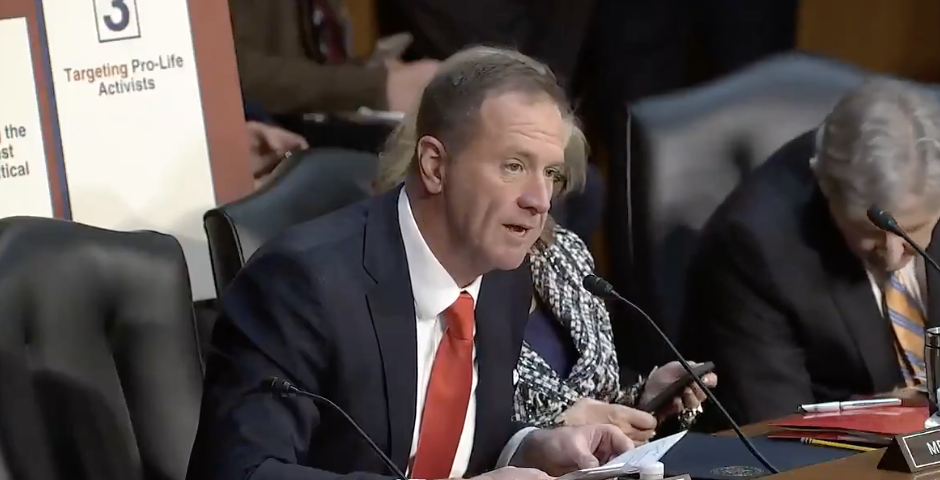Senator Eric Schmitt (R-MO), who served as attorney general of Missouri before being elected to the Senate, provided a thorough rebuke in an X thread of the U.S. Supreme Court’s 7-2 decision to temporarily halt the Trump Administration’s use of the Alien Enemies Act of 1798, which gives the federal government expanded powers to detain and deport illegal aliens suspected of belonging to foreign terrorist or criminal organizations.
“The Supreme Court bypassed normal appellate procedure to halt President Trump’s deportation of more illegal aliens,” Schmitt wrote. “There a lot of misinformation floating around about judicial rulings, the Alien Enemies Act, and immigration law.”
The senator first pointed to an earlier decision handed down by the high court on April 7, which overturned U.S. District Judge Jeb Boasberg’s temporary halt on the order and found the Obama-appointee had no jurisdiction over the deportation cases brought before him in a lawsuit filed by the ACLU.
In a 5-4 ruling, Supreme Court justices ruled that the Venezuelan deportees who filed the suit could only seek relief where they were confined, in this case Texas, rather than forum shopping for a friendly court in the nation’s capital.
“Last Wednesday, the ACLU filed, in [Northern District of Texas] before Judge Wes Hendrix, a habeas petition and a motion for an ex parte TRO, asking the court to enjoin the Trump Admin’s deportation of [Tren de Aragua] members confined in [Northern District of Texas] without giving the Trump Admin notice or opportunity to respond,” Schmitt explained.
“Judge Hendrix denied that TRO motion on Maundy Thursday explaining that it would decide in due course the petitioners’ claims. Judge Hendrix also instructed that any party opposing a TRO would have 24 hours to respond to a motion. “Unhappy with that result, the ACLU left a voicemail on Judge Hendrix phone requesting to speak to the Judge about the substance of the proceeding, an improper ex parte communication.”
It is prohibited under federal law to engage in ex parte communications with judges. The Code of Conduct for United States Judges explains that judges should not permit or consider ex parte communications “or consider other communications concerning a pending or impending matter that are made outside the presence of the parties or their lawyers.”
As part of the “emergency” nature of the claim, the ACLU imposed a 42-minute deadline on Judge Hendrix to grant its motion. Schmitt noted that this was a “highly unusual” request.
“Before Hendrix could issue an order, the ACLU filed an appeal to the Fifth Cir. and SCOTUS, freezing NDTX’s jurisdiction,” Schmitt continued. The [Fifth Circuit Court of Appeals] said it had no [jurisdiction] because Judge Hendrix had neither granted nor denied the motion, there was nothing to review. In an order with not opinion, SCOTUS, directed the Government not to remove any TdA members confined in NDTX marked for deportation under the AEA until there is more action from the Court.”
The senator added, “The worst part of the unreasoned order: SCOTUS enjoin the President acting under his core Article II powers to remove enemies of a foreign invading force. That is a first in American history and a grave threat to our separation of powers.”
Schmitt concluded the lengthy thread by pointing to a scathing opinion handed down by Judge Hendrix on Monday, in which the judge chastised the ACLU for its efforts to engage in ex parte communications with the court.
“What’s next? As for the TRO, the Trump Admin has responded to the ACLU’s emergency injunction app. pending at SCOTUS. It will resolve in the coming days and the Trump admin will likely win,” Schmitt wrote. “And the ex parte comms? The Trump admin will respond and, likely, ask for sanctions.”
The Supreme Court bypassed normal appellate procedure to halt President Trump’s deportation of more illegal aliens.
There a lot of misinformation floating around about judicial rulings, the Alien Enemies Act, and immigration law.
Let’s clear a few things up.
— Eric Schmitt (@Eric_Schmitt) April 22, 2025


